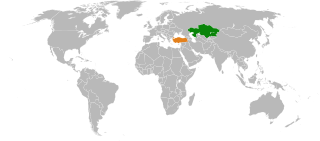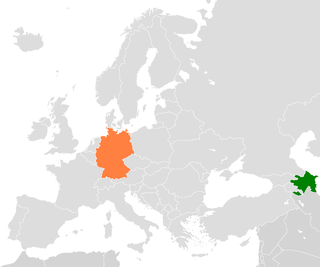
Foreign relations of Kazakhstan are primarily based on economic and political security. The Nazarbayev administration has tried to balance relations with Russia and the United States by sending petroleum and natural gas to its northern neighbor at artificially low prices while assisting the U.S. in the War on Terror. Kazakhstan is a member of the United Nations, Collective Security Treaty Organization, Organization for Security and Co-operation in Europe, North Atlantic Cooperation Council, Commonwealth of Independent States, the Shanghai Cooperation Organisation, and NATO's Partnership for Peace program. Kazakhstan established a customs union with Russia and Belarus, transformed into the Eurasian Economical Community then in 2015 into the Eurasian Economic Union. President Nazarbayev has prioritized economic diplomacy into Kazakhstan's foreign policy.

Though the Ministry of Foreign Affairs (MOFA) is the government agency responsible for the conduct of foreign relations of Nepal, historically, it is the Office of Prime Minister (PMO) that has exercised the authority to formulate and conduct policies related to Nepal's foreign affairs. As a landlocked country wedged between two larger and far stronger powers, Nepal has tried to maintain good relations with both of its neighbors, People's Republic of China and Republic of India. Nepal's relationship with China, India, and the United States has remained utmost priority for successive Nepali governments. The relationship between Nepal and India however was significantly hampered during the 2015 Nepal blockade by pro-Indian anti-Nepal protestors, where the Government of Nepal accused India of using "Russia-Ukraine" tactics to cause unrest along Nepal's southern border using ethnically Indian residents of Nepal. India strictly denied the allegation and said the unrest were solely due to Madheshi protesters. For the most part though, Nepal has traditionally maintained a non-aligned policy and enjoys friendly relations with its neighboring countries and almost all the major countries of the world.

Turkmenistan's declaration of "permanent neutrality" was formally recognized by the United Nations in 1995. Former President Niyazov stated that the neutrality would prevent Turkmenistan from participating in multi-national defense organizations, but allows military assistance. Its neutral foreign policy has an important place in the country's constitution. Although the Government of Turkmenistan claims to favour trade with and export to the United States, and Turkey, its single largest commercial partner is China, which buys the vast bulk of Turkmen natural gas via the Central Asia–China gas pipeline. Turkmenistan has significant commercial relationships with Russia and Iran and growing cross-border trade with Afghanistan. The Government of Turkmenistan often appears to use the conflicting interests of these regional powers as a means to extract concessions, especially on energy issues.

Uzbekistan joined the Commonwealth of Independent States in December 1991. However, it is opposed to reintegration and withdrew from the CIS collective security arrangement in 1999. Since that time, Uzbekistan has participated in the CIS peacekeeping force in Tajikistan and in United Nations-organized groups to help resolve the Tajik and Afghan conflicts, both of which it sees as posing threats to its own stability. Uzbekistan is an active supporter of U.S. efforts against worldwide terrorism and joined the coalitions which have dealt with both Afghanistan and Iraq. It is a member of the United Nations, the Euro-Atlantic Partnership Council, Partnership for Peace, and the Organization for Security and Cooperation in Europe (OSCE). It belongs to the Organisation of Islamic Cooperation (OIC) and the Economic Cooperation Organization, which comprises 7 Central Asian countries: Pakistan, Uzbekistan, Kazakhstan, Turkmenistan, Afghanistan, Kyrgyzstan and Tajikistan. It is a founding member of and remains involved in the Central Asian Union, formed with Kazakhstan and Kyrgyzstan, joined in March 1998 by Tajikistan.

Foreign relations of Israel refers to diplomatic and trade relations between Israel and other countries around the world. Israel has diplomatic ties with 164 of the other 192 UN member states as of December 2020. Israel is a member of the United Nations (UN) and a number of other international organisations. Israel maintains full diplomatic relations with two of its Arab neighbours, Egypt and Jordan, after signing peace treaties in 1979 and 1994 respectively. In 2020, Israel signed agreements establishing diplomatic relations with four Arab League countries, Bahrain, the United Arab Emirates, Sudan and Morocco. As of 2021, Israel had formal diplomatic relations with 168 other countries, while twenty-eight UN member states have either never established, or have broken off diplomatic relations with Israel.

The Economic Cooperation Organization or ECO is an Asian political and economic intergovernmental organization that was founded in 1985 in Tehran by the leaders of Iran, Pakistan, and Turkey. It provides a platform to discuss ways to improve development and promote trade and investment opportunities. The ECO is an ad hoc organisation under the United Nations Charter. The objective is to establish a single market for goods and services, much like the European Union. After the dissolution of the Soviet Union, the ECO expanded to include Afghanistan, Azerbaijan, Kazakhstan, Kyrgyzstan, Tajikistan, Turkmenistan, and Uzbekistan in 1992.

The Ministry of Foreign Affairs is the governmental body responsible for conducting foreign relations of the Republic of Turkey. The Ministry is responsible for Turkey's diplomatic missions abroad and for the promotion of Turkish culture, as well as for implementing the country's foreign policy in accordance with its national interests. Established on 2 May 1920, its primary duties are administering diplomatic missions, negotiating international treaties and agreements, and representing the Republic of Turkey at the United Nations. The ministry is headquartered in the Turkish capital of Ankara and counts on more than 200 missions as embassies, permanent representation offices and consulates general, abroad. As of 2021, the Ministry of Foreign Affairs maintains 235 diplomatic posts worldwide. The current Minister of Foreign Affairs is Mevlüt Çavuşoğlu, who has held the position since 29 August 2014.

Russia–Turkmenistan relations are the bilateral relations between Russia and Turkmenistan. Russia has an embassy in Ashgabat and a consulate-general in Türkmenbaşy. Turkmenistan has an embassy in Moscow. In 1885 the modern-day Turkmenistani region became absorbed into the Russian Empire. After 1924 it became a Soviet Socialist Republic within the Soviet Union until declaring independence in 1991. The two nations have thus been mutually friendly for the past centuries.

China–Turkey relations are the international relations between China and Turkey. Current official relations were established in 1934 and Turkey recognized the People's Republic of China (PRC) on 5 August 1971.

Kazakh–Turkish relations are foreign relations between Kazakhstan and Turkey. Turkey recognized Kazakhstan on 16 December 1991, being the first state to recognize the independence of Kazakhstan, when Kazakhstan declared its independence. Diplomatic relations between the two countries were established on 2 March 1992. These relations have developed positively on the international stage as well as in commerce and strategic affairs. Kazakhstan has an embassy in Ankara and a consulate general in Istanbul. Turkey has an embassy in Astana and a branch office in Almaty.

Hungary–Turkey relations are the bilateral relations between Hungary and Turkey. Both countries are full members of the Council of Europe, the OECD, the NATO, the OSCE and the WTO. Also Hungary is an EU member and Turkey is a candidate. Hungary has observer status in the Organization of Turkic States, in which Turkey is a full member.

Belgian–Turkish relations are foreign relations between Belgium and Turkey. Belgium has an embassy in Ankara, a consulate–general in Istanbul and two consulates in Antalya and Izmir. Turkey has an embassy in Brussels and a consulate–general in Antwerp.

Malaysia–Turkey relations are the foreign relations between Malaysia and Turkey. Turkey has an embassy in Kuala Lumpur, and Malaysia has an embassy in Ankara and Istanbul. Both countries are the full members of the World Trade Organization (WTO) and the Organisation of the Islamic Conference (OIC). Both countries are also classed as regional powers and middle powers in their respective regions.

Iran–Kazakh relations are the foreign relations and diplomatic ties between Iran and Kazakhstan.

The Organization of Turkic States (OTS), formerly called the Turkic Council or the Cooperation Council of Turkic Speaking States, is an intergovernmental organization comprising prominent independent Turkic countries: Azerbaijan, Kazakhstan, Kyrgyzstan, Turkey and Uzbekistan. It is an intergovernmental organization whose overarching aim is promoting comprehensive cooperation among Turkic-speaking states. First proposed by Kazakh President Nursultan Nazarbayev in 2006, it was founded on 3 October 2009, in Nakhchivan. The General Secretariat is in Istanbul.

Malaysia–Turkmenistan relations refers to foreign relations between Malaysia and Turkmenistan. Malaysia has an embassy in Ashgabat, and Turkmenistan has an embassy in Kuala Lumpur.

The diplomatic relations between Azerbaijan and Germany established in 1992 after Germany recognized the independence of Azerbaijan.

Relations between Turkic Council and Azerbaijan started from the year of 2009 until present. Taking into account of the establishment date of the organization, Azerbaijan continues relations as a member of the founding country.

Bolivia–Turkey relations are foreign relations between Bolivia and Turkey. Turkey has had an embassy in La Paz since February 14, 2018. In September 2022, Bolivia opened an embassy in Ankara.

Following Uzbekistan's independence from the Soviet Union, Turkey has been especially active in pursuing economic projects and social, cultural, and diplomatic initiatives in Uzbekistan. On December 16, 1991 Turkey was the first country to recognize Uzbekistan and among the first to open an embassy in Tashkent.





















